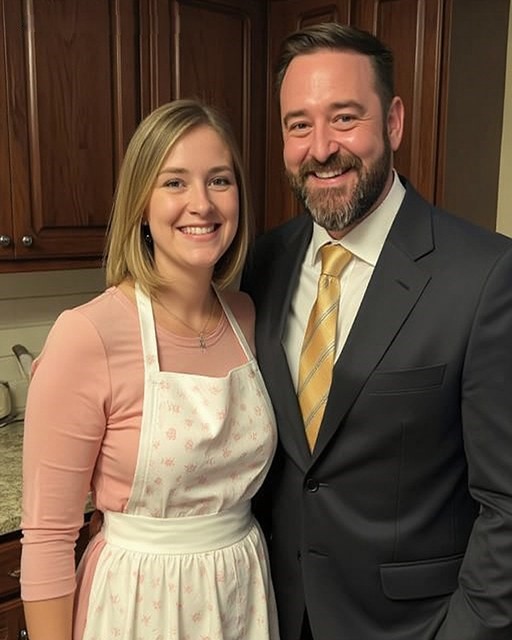Soon it escalated. His family began dropping in every week—sometimes they called, sometimes they didn’t. He’d settle into the living room with his father, pouring drinks and holding court, while I scrambled in the kitchen to stretch pantry scraps into meals for six or more. I told myself it was temporary, that being gracious and accommodating would help me win their approval.
Then came the breaking point.
It was a Saturday, after one of the most brutal workweeks I’d ever had. I carved out a day just for myself. I brewed coffee, opened a book I’d been meaning to read, and lit a lavender candle beside the bath. Finally, I thought, a few stolen hours of peace.
At noon, the doorbell rang. Standing on the porch were his parents and brother, all smiles. “We thought we’d pop in for lunch!” Margaret chirped.
“Perfect timing,” Christopher said, ushering them in. Then he turned to me with that same casual expectation, his voice bright: “My wife will whip something up.”
Something inside me snapped.
“No,” I said.
The room went still. His parents blinked, confused. Christopher frowned as if I’d spoken a foreign language.
“What do you mean, no?”
“I mean I’m not cooking,” I replied. “I wasn’t expecting company, and I planned a day to rest. You’re welcome to order food.”
His face hardened. “You’re supposed to be a wife, not a guest!”
The words cut deeper than a slap. I swallowed the lump in my throat and said quietly, “If being a wife means giving up my dignity, then maybe I misunderstood marriage.” Then I went upstairs, closed the door, and let them order takeout without me.
That night, Christopher stood in the bedroom doorway, arms crossed. “You embarrassed me,” he accused.
“I embarrassed you?” I shot back. “You volunteered me like a servant. You humiliated me in front of your family.”
“This is how my family operates,” he insisted. “My mother did it. My sisters do it. Why should you be any different?”
“Because I’m not your mother,” I said, my voice shaking but steady. “I work full-time. I contribute just as much as you do. I will not prove my worth in the kitchen every weekend.”
“So you think you’re too good for us?”
“No,” I said. “I think I deserve a partner.”
The silence that followed was heavier than any argument. We slept back-to-back that night, the air between us brittle with tension. In the days that followed, the surprise visits slowed, but the judgment lingered—more subtle now, but still sharp. Yet in that space of discomfort, something grew inside me. Clarity.
I began to replay the moments I had bent over backward to fit their mold, the countless Sundays I’d swallowed exhaustion to keep the peace, the thousand times he never once asked, “How can I help?”
I realized that if I caved now, I would set the tone for the rest of my life.
So one evening, I asked him to sit down. My hands trembled, but my voice didn’t. “Christopher, I can’t live like this. If you want a wife whose sole purpose is to recreate your mother’s role, I’m not her. I want a partner. Decide which you want.”
He sat quietly for a long time, staring at me. Something flickered across his face—hesitation, maybe fear. Finally, we talked. For hours. It was messy and raw, but honest. He admitted that he had never questioned his family’s “normal.” I admitted that I had avoided conflict instead of setting boundaries.
It didn’t change overnight, but it did change. We found a counselor. He began helping in the kitchen instead of waiting for food to appear. He told his family that unannounced visits were no longer acceptable. When Margaret made a pointed comment, he shut it down—without looking to me to fix it.
He stumbled at times. I bristled at others. But slowly, the shape of our marriage began to shift.
The real turning point wasn’t the therapy or even his eventual understanding. It was the moment I said “no.” The moment I refused to let someone else’s outdated script decide who I was in my own home.
My mother was right: marriage is a partnership. But what she didn’t say—what I had to learn—is that partnership requires boundaries. If one person always serves while the other always benefits, that isn’t teamwork. That’s servitude.
I am not a guest in my marriage. And I will never live like one again.

